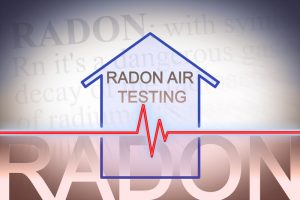“Radon” is one of the scariest words a homeowner (or business owner) can hear. This substance is one of the great boogeymen of public health in the United States—but unlike childhood boogeymen, radon is real, as is its danger.
But most people don’t know what radon actually is, or what sort of health hazards it poses that make it so urgent to get radon testing done. It’s a long subject, but in this post we will try to get to the heart of the problem so you’ll understand why radon testing in Portland, OR is something you shouldn’t delay.
Radon is a chemical element (Rn). It occurs as a product of the decay of uranium and thorium, which first produce radium, and then radon. Radon is gaseous, colorless, odorless… and radioactive.
Radon decays as well, and the product of this isn’t gaseous, but solids that can adhere to most surfaces. These “radon daughters” are the main danger that radon presents, since if humans inhale these particles, they will stick to the inside airways of lungs. The radioactivity of these radon daughter particles increases the chances of lung cancer. According to the EPA, radon is the second leading cause of lung cancer after cigarettes and accounts for approximately 20,000 cancer-related deaths each year. Radon is responsible for the majority of the public’s exposure to radiation.
How does this apply specifically to housing? In 1985, an accident led to the discovery of large concentrations of radon inside many U.S. homes. At least some level of radon is present in every home: it usually enters the lower levels of a house, such as the basement, from the ground, infiltrating through cracks, the water supply, and gaps around service pipes.
You almost certainly have some levels of radon in your home, but don’t panic yet. The concentration might be low enough to pose little danger. However, you need to be certain—and radon can enter the best-sealed homes or those without have basements. Professional radon testers can detect if you have a potentially dangerous radon concentration, and then devise a mitigation solution that will give you improved air quality… and peace of mind.
You can’t see, smell, or taste radon, and so you might shrug off the possibility of it lurking around your house. Please don’t make such a potentially hazardous assumption. Contact Clean Air Act and our radon detection and mitigation specialists. We offer complete testing and abatement service to protect you and your family from one of the only true “boogeymen” you’ll find hidden in your home. Contact us today for radon testing in Portland, OR.
Continue Reading
Tags: Portland, Radon Testing
Posted in Indoor Air Quality | Comments Off on What Is Radon and Why Is It Dangerous?
 Whatever you do, don’t panic! Consumers buy homes all the time that end up having radon problems. If the story ended there, it would be all over the news and we’d have a catastrophe on our hands. The reality is that there are many solutions to this kind of problem in your home, and with proper testing and mitigation, you can be as radon-free as any other home in your neighborhood. Have you stopped panicking yet?
Whatever you do, don’t panic! Consumers buy homes all the time that end up having radon problems. If the story ended there, it would be all over the news and we’d have a catastrophe on our hands. The reality is that there are many solutions to this kind of problem in your home, and with proper testing and mitigation, you can be as radon-free as any other home in your neighborhood. Have you stopped panicking yet?
 Do you live on the fourth floor of a building? No? Then you might want to pay attention. Radon is the number-one cause of lung cancer among non-smokers, according to the EPA, which is reason enough to be up to date on your radon testing. But how your home is built and how the radon mitigation is installed is what really dictates how susceptible you and your family are to the harmful effects of radon. Whether you just moved, your living patterns have changed, or you haven’t had a radon test in recent memory, it is always good to be vigilant and schedule a test as soon as possible.
Do you live on the fourth floor of a building? No? Then you might want to pay attention. Radon is the number-one cause of lung cancer among non-smokers, according to the EPA, which is reason enough to be up to date on your radon testing. But how your home is built and how the radon mitigation is installed is what really dictates how susceptible you and your family are to the harmful effects of radon. Whether you just moved, your living patterns have changed, or you haven’t had a radon test in recent memory, it is always good to be vigilant and schedule a test as soon as possible. Heating and air conditioning is one half of HVAC. The other half is ventilation and indoor air quality. Simply controlling the temperature of the air is not enough to give you a complete portrait of home comfort.
Heating and air conditioning is one half of HVAC. The other half is ventilation and indoor air quality. Simply controlling the temperature of the air is not enough to give you a complete portrait of home comfort.